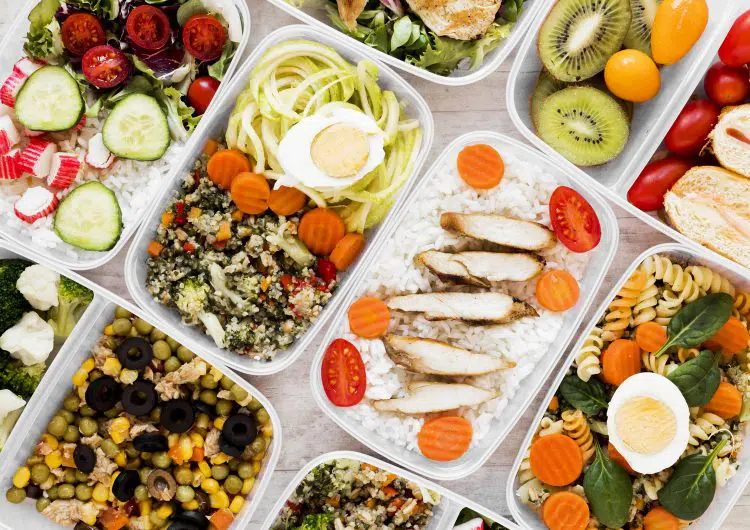Most people join a gym to lose weight. However, only a few ever achieve their weight loss objective.
Some blame their genetics for their inability to lose weight, while others throw their trainers under the bus.
The truth is that people often overcomplicate weight loss. This is why fad diets become such mega-hits overnight. People want quick ways to shed the spare tire even if there is no scientific evidence backing the methods.
A review published in the Journal of Human Nutrition and Dietetics found that incorporating habit-focused strategies into your routine can help weight loss maintenance. (1)
Over the last decade, I have helped hundreds of people lose (and maintain) body weight.
In this article, I share the top 10 simple habits that can help you achieve and maintain a healthy body weight. The best part? You can apply these habits instantly, and the results will be visible within a week. Without any further ado, check out the most effective weight loss habits:
1. Mindful Eating is Key
In the age of Instagram, TikTok, YouTube, and Netflix, many people catch up on their favorite shows while eating their meals.
However, when you’re not paying attention to food, you’re more likely to miss the fullness cues that your body gives you. This is a surefire way to overeat and jeopardize your weight loss ambitions.
Mindful eating involves being mentally present while eating your meals.
It comprises shunning distractions and being aware of how your food smells, looks, tastes, and feels as you eat. You are not allowed to use your phone, watch TV, or talk to a friend while eating.
Tips For Mindful Eating
Here are some tips to eat mindfully:
- Pace Yourself: I recommend placing your fork down between bites. Count how many times you chew the food before gulping. This gives your body time to register what and how much you’re eating.
- Turn off Disruptions: Folks who lack self-control can keep their phone, laptop, and tablet in the other room while eating. Any kind of multi-tasking is a big no.
- Taste with Intention: Make it a point to notice the texture and flavors of the food. Keeping a journal can be incredibly effective for this.
Benefits of Mindful Eating
Many people notice a reduction in their portion sizes when they begin eating mindfully. Since your body begins registering hunger and fullness cues better, it prevents unintentional overeating.
A study published in the Annals of Nutrition and Metabolism suggests a negative correlation between mindful eating scores and BMI (Body Mass Index), meaning individuals who eat mindfully may be more likely to have a healthier BMI. (2)
2. Focus on Whole Foods
While most people know that whole foods are better than processed foods, they don’t know how to differentiate between them.
Unlike processed foods, whole foods are as close to their natural state as possible, which keeps their nutrient content intact. Whole foods provide your body with a healthy dose of macro and micronutrients.
Fruits, vegetables, seeds, whole grains, legumes, unprocessed meats, fish, and eggs are some popular whole foods. Pre-packaged snacks, refined grains, and sugary cereals are forms of processed foods.
How To Incorporate More Whole Foods Into Your Diet
Here are ways to add more whole foods to your daily routine to maintain a healthy body weight:
- Change Your Snacks: Eat an apple with peanut butter instead of chips. Carry a handful of mixed nuts and berries with you as snacks.
- Meal Prep: Planning and preparing your meals in advance is one of the best ways to achieve your weight loss objectives. Dedicate a few hours on the weekend to batch-cook your healthy meals. It significantly lowers your chances of feasting on junk food when hunger strikes at odd hours.
- Opt For a Healthy Breakfast: Many people eat sugar-laden cereals for breakfast, which can hamper their metabolism and throw their macros off balance. Instead, prefer whole foods like oatmeal, eggs, whole wheat bread, and an avocado for breakfast.
- Eat a Balanced Meal: Half your plate should be filled with colorful veggies. A quarter of the plate should comprise lean protein, whereas the remaining quarter should be whole grains like quinoa and brown rice.
A 2021 study published in the Journal of Obesity & Metabolic Syndrome found that focusing on whole, minimally processed foods is a common factor in successful and sustainable weight management. (3)
3. Hydration is Essential
The human body is 70 percent water. Every cell in the human body needs water to function optimally.
Dehydration can hamper basic functions like waste excretion, nutrient supply to the cells, and temperature regulation. It can also negatively impact one’s ability to burn calories efficiently.
Furthermore, a lack of water can also make you feel hungry. As a rule of thumb, you should drink a glass of water before each meal, especially if you are feeling overly hungry. The body easily mixes up signs of hunger and thirst.
A review published in The American Journal of Clinical Nutrition concluded that increasing water intake while following a weight management plan led to greater weight loss over 3-12 months than diet alone. (4)
How To Increase Your Water Intake
Drinking a gallon of water daily can be challenging, especially for beginners. Here are some ways to boost your water intake:
- Buy a Water Bottle: Carrying a water bottle wherever you go lowers the chances of staying thirsty during the day.
- Add Flavor: You could infuse the water with cucumber or lemon slices to flavor the water and make it more satiating. However, you must avoid adding calorie-laden products to the water.
- Set Reminders: Use your phone’s reminder app to set water break alerts every 30 minutes. You’ll be surprised how easy drinking a gallon of water can be.
4. Prioritize Activity, Not Just Exercise
Exercise is great, but you shouldn’t limit your daily physical activity to one 30- to 45-minute gym session.
Non-Exercise Activity Thermogenesis (NEAT) is as crucial to maintaining a healthy body weight as your training session. NEAT involves all the calories you burn throughout the day while doing physical activities like walking, washing dishes, and mowing the lawn. (5)
Here are some of the most effective ways to boost NEAT:
- Step Goals: Beginners should set a 5,000 to 7,500 daily step goal for themselves. On the other hand, advanced exercisers can opt for a 10,000-step goal. Take multiple 10 to 30-minute walks throughout the day to hit your step goal.
- Fidget Freely: Although most people advise against fidgeting, it is one of the most effective ways of burning calories throughout the day. This is also why people who make a lot of hand and head gestures while talking are usually thin.
- Do the Chores: Chores can be boring and repetitive, but they are an excellent way to burn calories and maintain a healthy body weight.
- Upgrade Your Work Setup: Folks who spend most of their day at a desk should consider upgrading to a standing table. Brownie points for people who get an under-desk treadmill.
5. Quality Sleep is Crucial
Contrary to what the hustle culture would have you believe, sleeping for less than five hours a day shouldn’t be worn as a badge of honor.
Sleep is when your body recovers and repairs. You might have burned 1,000 calories on the treadmill, but the weight will come off your body while you’re sleeping. Not giving your body enough time to repair can be counterproductive.
The body also balances its hormone production during sleep. If you don’t sleep enough, the body spikes ghrelin levels, which increases cravings. (6)
You must sleep for at least seven to eight hours each night to maximize your recovery potential.
Tips To Create a Sleep-Friendly Routine
Fixing your sleep schedule is easier than most people think. Here is how to do it:
- Set a Consistent Schedule: Stick to a regular sleeping schedule. You’ll be amazed how easy falling asleep is if you hit the sack at the same time each day.
- Wind Down: Create and follow a sleep routine. It signals to your subconscious that the day is coming to an end.
- Fix Your Bedroom: Your bedroom should be dark, cool, and quiet. Use blackout curtains, eye masks, and earplugs, if necessary.
While these habits can help you quickly fall asleep (and maintain a healthy weight), you must remember that forming habits takes time. Be patient and consistent, and the results will follow.
6. Manage Stress for Optimal Health
Let’s be honest. Eliminating stress is nearly impossible. After all, we have to manage work deadlines, family obligations, and friends’ commitments all at the same time.
Chronic stress spikes cortisol levels, also known as the stress hormone.
Higher cortisol levels trigger the body to store excess fat, especially around the belly. Our body does this as our built-in fight-or-flight response kicks in, and it predicts a shortage of foods in the near future.
Higher stress levels can also increase cravings and make sticking to a healthy diet more challenging.
Ways To Tackle Stress
Use the following methods to tackle chronic stress:
- Mindfulness: Take five minutes first thing in the morning (or any other time you feel fit) to meditate. If you can’t stay still, use this time to practice gratitude.
- Breath Work: Taking deep, belly breaths can help turn off the fight-or-flight response. Focus on slow and controlled exhales to calm yourself.
- Walk: Going outdoors for a walk can help lower your stress levels.
- Journal: Putting your thoughts on paper can help vent your frustration and find solutions. Aim for one page a day.
I recommend consulting a psychiatrist if you don’t see any improvements from following these methods.
7. Ditch the ‘Diet’ Mentality
Most people consider ‘diets’ a short-term thing. They want to start a new diet, shed some kilos, and then return to their old eating habits.
However, following an overly restrictive diet can be a disaster on multiple levels.
First, dieting to lose weight quickly can lead to a negative relationship with food. Remember, recovering from an eating disorder can be an uphill battle. It is much better to take your time and lose weight slowly.
Plus, most people end up regaining the lost weight as soon as they revert to their old eating habits.
Instead, you must develop a diet that suits your lifestyle, eating preferences, and weight loss objectives. Beginners should work with a professional to design a nutrition program around their internal cues like hunger, fullness, and satiety.
Pro Tip: Avoid labeling food as ‘good’ or ‘bad.’ Find foods that fit your macro and micronutrient goals and stick with them.
8. Progress, not Perfection
Some people never start their weight loss journey because they want to master the subject before they wet their feet.
However, exercise and nutrition science are constantly evolving, and waiting for the ultimate research and complete knowledge is a waste of time.
In my seven years as a personal trainer, folks who consistently succeed aren’t the most methodical or knowledgeable; they are the ones with a flexible mindset.
Key Habits For Constant Progress
Here are the other vital habits of people who have cracked how to maintain a healthy weight:
- Think Long-Term: Losing and maintaining weight is not a short-term project. Depending on your current fitness levels, you might need a complete lifestyle overhaul to achieve your fitness objective.
- Chase Small Wins: Break your big goals into smaller objectives. For instance, set yourself a goal of losing 2 pounds weekly instead of aiming to lose 16 pounds in eight weeks. Ticking off smaller goals will keep you motivated.
- Progress Isn’t Linear: Weight loss progress isn’t always a straight path. You might lose 2 pounds in the first week, but your weight might stall for the next week. This doesn’t mean you are on the wrong path. It just means your body is taking some time to adjust to your new lifestyle.
- Be Flexible: Fitness and weight loss shouldn’t be an ‘all or nothing’ endeavor. You don’t have to go cold turkey on your favorite foods. Limit them to your cheat meals to keep your sanity.
- It’s a Journey: You must constantly evolve and evaluate your fitness program to maintain a healthy body weight. However, don’t get overwhelmed in the process. Enjoy the process and embrace all the lessons you learn along the way.
9. Meal Planning and Preparation
The first step is to choose a diet that fits your lifestyle and objectives.
There are several diets you can choose from — intermittent fasting, Mediterranean, Paleo, keto, vegan, Atkins, IIFYM — you get the idea.
Irrespective of which plan you choose, you must prep your meals well in advance, especially if your goal is to banish the muffin top and maintain a healthy weight. Here is why meal planning matters:
- Time Saver: Allocating a weekend to your meal prep ensures that you don’t have to spend time cooking your meals daily. You can use this time for work or rest.
- Healthy Choices: You are more likely to make healthy food choices when preparing your meals in advance.
- Lowers the Chances of Eating Junk Food: Having healthy food at hand minimizes the risk of devouring junk food when you are hungry.
Tips For Meal Planning
As someone who has been in the game for over 16 years, I have picked up some tricks along the way. Here is how you can streamline your meal prep:
- Protein Powder: This is a godsend. Protein powders are a quick digesting food source that can be consumed after a training session or when a fit of cravings knocks at the door.
- Veggies and Fruits: Aim to eat at least half a plate of colorful veggies and fruits with each meal. They are rich in fiber, carbs, and antioxidants and ensure you’re meeting your daily micronutrient targets.
- Whole Grains: Always pick brown rice, quinoa, or whole-wheat options over refined grains. Don’t be shy about making special requests at restaurants.
Remember, no two people react to the same diet and foods the exact way. This is the reason following a vanilla diet program you find online won’t get you much results.
Your weight loss journey will be unique. I highly recommend working with a registered nutritionist to design a personalized diet program that fits your unique needs and lifestyle. It will increase your odds of sticking to the diet plan in the long term.
10. Smart Snacking Strategies
Among the simple habits of people who maintain a healthy body weight, smart snacking strategies are always the most overlooked.
You’re wrong if you think people who are in perfect shape never snack or eat junk food. When done right, snacking can be a powerful tool for managing hunger, keeping your metabolism firing on all cylinders, and maintaining your sanity.
Here are the things you must remember while snacking:
- Have a Purpose: Before you reach out for your favorite processed snack, ask yourself, “Am I truly hungry, or am I bored, anxious, or stressed?” If it is the latter, drink a glass of cold water and go out for a walk.
- Whole Food Snacks: Snacks don’t always have to be unhealthy. Always keep nuts, fruits, and vegetables at hand to ensure you are nourishing your body well.
Healthy Snacking Options
Are you thinking about stocking up your pantry? Here are a few healthy snacking options that you can add to your shopping cart:
- Nuts and seeds
- Fruits (apples and banana)
- Peanut butter
- Greek yogurt
- Eggs
- Whole-grain crackers
- Hummus
Conclusion
Mindful eating, staying hydrated and active throughout the day, getting enough sleep, and managing stress levels are among the most common habits among individuals who maintain a healthy body weight year around.
You don’t need to restrict yourself to a handful of foods to lose weight. Your meal plan should align with your lifestyle to ensure you can stick with it for the longer term. Start with small changes and build on them gradually.
If you have any questions about weight loss, drop them in the comments below, and I’ll be happy to help!
References
Fitness Volt is committed to providing our readers with science-based information. We use only credible and peer-reviewed sources to support the information we share in our articles.
- Cleo, G., Isenring, E., Thomas, R., & Glasziou, P. (2017). Could habits hold the key to weight loss maintenance? A narrative review. Journal of human nutrition and dietetics: the official journal of the British Dietetic Association, 30(5), 655–664. https://doi.org/10.1111/jhn.12456
- Demirbas, N., Kutlu, R., & Kurnaz, A. (2021). The Relationship between Mindful Eating and Body Mass Index and Body Compositions in Adults. Annals of nutrition & metabolism, 77(5), 262–270. https://doi.org/10.1159/000518675
- Kim JY. Optimal Diet Strategies for Weight Loss and Weight Loss Maintenance. J Obes Metab Syndr. 2021;30(1):20-31. doi:10.7570/jomes20065
- Muckelbauer, R., Sarganas, G., Grüneis, A., & Müller-Nordhorn, J. (2013). Association between water consumption and body weight outcomes: a systematic review. The American journal of clinical nutrition, 98(2), 282–299. https://doi.org/10.3945/ajcn.112.055061
- Chung N, Park MY, Kim J, et al. Non-exercise activity thermogenesis (NEAT): a component of total daily energy expenditure. J Exerc Nutrition Biochem. 2018;22(2):23-30. doi:10.20463/jenb.2018.0013
- Papatriantafyllou E, Efthymiou D, Zoumbaneas E, Popescu CA, Vassilopoulou E. Sleep Deprivation: Effects on Weight Loss and Weight Loss Maintenance. Nutrients. 2022;14(8):1549. Published 2022 Apr 8. doi:10.3390/nu14081549
Tip: If you're signed in to Google, tap Follow.














